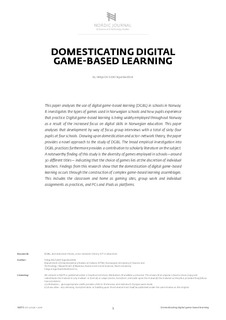Domesticating digital game-based learning
Journal article, Peer reviewed
Permanent lenke
http://hdl.handle.net/11250/2430278Utgivelsesdato
2016Metadata
Vis full innførselSamlinger
Originalversjon
Nordic Journal of Science and Technology Studies. 2016, 4 (1), 5-16.Sammendrag
This paper analyses the use of digital game-based learning (DGBL) in schools in Norway. It investigates the types of games used in Norwegian schools and how pupils experience that practice. Digital game-based learning is being widely employed throughout Norway as a result of the increased focus on digital skills in Norwegian education. This paper analyses that development by way of focus group interviews with a total of sixty-four pupils at four schools. Drawing upon domestication and actor-network theory, the paper provides a novel approach to the study of DGBL. The broad empirical investigation into DGBL practices furthermore provides a contribution to scholarly literature on the subject. A noteworthy finding of this study is the diversity of games employed in schools—around 30 different titles— indicating that the choice of games lies at the discretion of individual teachers. Findings from this research show that the domestication of digital game-based learning occurs through the construction of complex game-based learning assemblages. This includes the classroom and home as gaming sites, group work and individual assignments as practices, and PCs and iPads as platforms.

